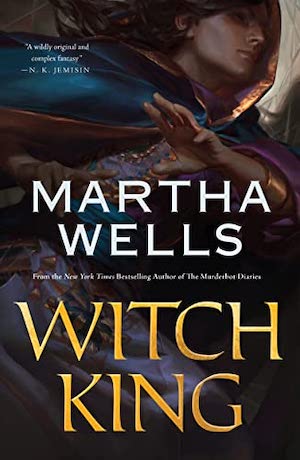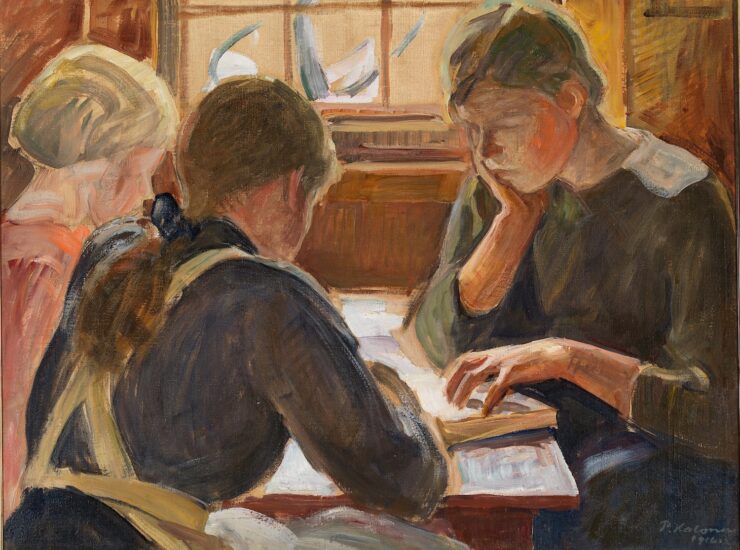There’s a lot of anxiety in the air lately, which is understandable. What is somewhat less understandable is the way it’s getting its sticky little anxiety fingers on the topic of books and reading. People seem confused about why other people have bookshelves with books on them. There are men griping about things so trivial as the little notes estimating reading time for online essays. Do we need these notes? No. Are they accurate for everyone? No. Are they “antithetical to real reading”? Also no. We are all free to ignore them.
And we are all free to do whatever we like with out books—to keep them, to toss them, to build our own libraries that reflect our own growth and reading lives. To do this is not, as one op-ed recently put it, to belong to a cult of book ownership. You can have a lot of books on the shelves behind you in all your Zoom meetings, or you can have zero books visible in your house. Neither one says anything definitive about you as a person.
Your personal library, however big or small, is fine just the way it is.
To some degree, I understand why people get this way. I too have rolled my eyes at a too-impassioned book tweet, a post about how books are as important as air, a bit of cheesy book merchandise that abuses that one Peter Dinklage quote from Game of Thrones. There is being a reader, and there is performing “being a reader,” and they are not necessarily the same thing.
But it really doesn’t matter.
If you’re reading, you’re reading, no matter what it is. If collecting books brings you joy, line the walls of your home with double-stacked bookcases until the floorboards groan. If you want to own one book at a time—the one you’re reading at any given moment—and you take pleasure in that? Do it. If you prefer reorganizing your digital books to blowing dust off all the physical ones, do that.
Do we read to learn? To embiggen our knowledge about the world? To understand and empathize, to thrill and question and doubt and shudder? Yes. Yes, a thousand times yes; all this and more. But we also read for joy. For pleasure, for distraction, for amusement and diversion and for company. Some of that joy and pleasure and company comes from the book as object as well as the book as ideas and story and writing.
Buy the Book


Witch King
It isn’t smug and it isn’t the work of some kind of book-geek cult to want to surround yourself with things that bring you joy. (It is also fine to get rid of things that don’t serve this purpose anymore, and to change your mind about this at any given moment, even—perhaps especially!—if you are Marie Kondo herself.) Book collecting is just one aspect of who each of us is as a reader. Books do say something about the people who own them, but it is a rare situation in which you can look at a bookcase and draw a definitive conclusion about the person to whom it belongs. What you get are glimpses, fleeting ideas about what their passions are, what intrigues them, what kind of worlds they spend their time in, and what you might have in common.
This is why I look at people’s bookshelves on Zoom, or in person, or in photographs: What do we share? What curiosities might I find there? What book that I love to bits is shelved right where the camera can see it? What did this person read that I might want to read? As Leah Schnelbach puts it:
I’ve been revisiting interviews with Tony Kushner—video interviews, one with the late composer Michael Friedman, some conducted over Zoom to promote his collaborations with Steven Spielberg. In most interviews he’s sitting in front of a WALL OF BOOKS, and in some the camera actually spends time lovingly caressing his bookcases. I can’t tell you how many screenshots I’ve taken to try to zoom in and note down all the titles, and I can’t describe the thrill of getting this …. exteriorization of the brain of one of my favorite writers. Kushner could, and he’d probably find a way to tie the description into an analysis of Marxist ideology and, I don’t know, a spicy anecdote about the life of Herman Melville or something, but me, I’ll just say it makes me super happy to see which books people choose to keep and put out on their shelves.
When someone doesn’t have visible books in their home, it can be disappointing. Not because they’re a failure of a person, but because I can’t snoop on the things that fuel their imagination or curiosity. But—with apologies to John Waters and his unforgettable quote—a lack of books on display doesn’t actually say anything about a person. Not when they might have a tiny little device on a table that stores thousands of stories, like something out of a myth. You can’t peek in on someone’s collection of digital books quite the same way; even if they’re on Goodreads, it’s not the same as picking up someone’s copy of a book and seeing their notes and ephemera (or noticing that none of those things are there).
That still doesn’t matter.
My dad reads more books than I do. He says it’s around 100 a year, but I’m convinced it’s more; he has always read something I haven’t gotten to yet. But you would never know this from his bookshelves, which are sparsely stacked, more space given to photographs than books. Most of his reading comes from the library. Whatever conclusions you might want to draw from what you see in his house would be wildly uninformed. Having books isn’t important to him the way it is to me (though he used to have a lot more books, as he says, “in a previous life”).
Having books and reading books are entirely different things. But the books a person does have aren’t just objects from which all the useful information has been drained. A read book isn’t an empty milk carton; it’s still full, still promising, still valuable to someone who loves it. It’s words on a page, but it’s also ideas between the lines, memories of the other times you’ve read or moved or thought about it, conversations you’ve had about it, other books it led you to.
People collect different things: figurines, clothes, glassware, paintings, crafts, candles, you name it. We do what we can to make ourselves comfortable in an often uncomfortable world. If that means putting every book you finish into a little free library and leaving your shelves spare or covered in decorative objects, that’s okay. If that means saving every book you’ve ever read, that’s okay too. It only means what you want it to. All that matters is what it means to you. There’s no need to be anxious about it.
Mark as Read will be on hiatus for the month of February—though there may be some reruns of previous posts. See you in March!
Molly Templeton lives and writes in Oregon, and spends as much time as possible in the woods. Sometimes she talks about books on Twitter.














